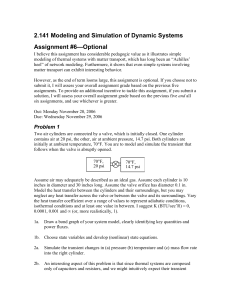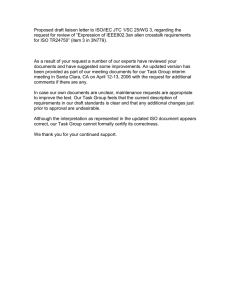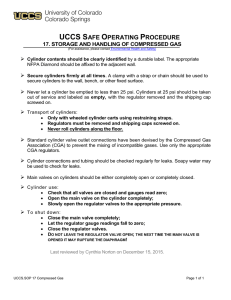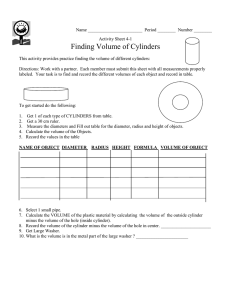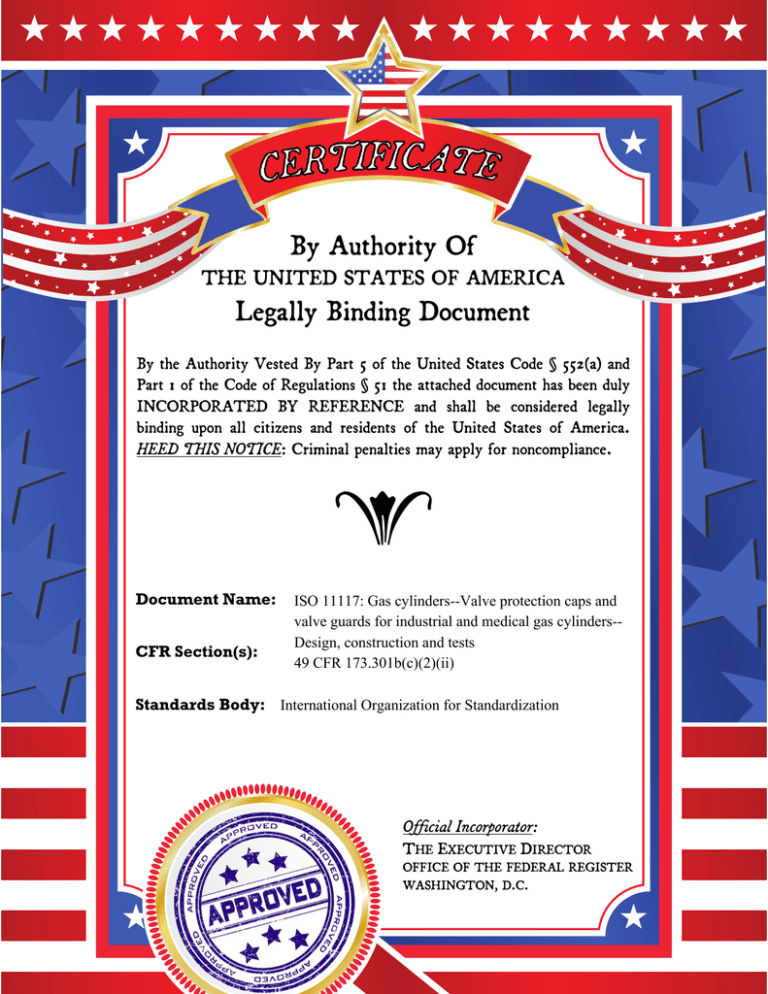
By Authority Of
THE UNITED STATES OF AMERICA
Legally Binding Document
By the Authority Vested By Part 5 of the United States Code § 552(a) and
Part 1 of the Code of Regulations § 51 the attached document has been duly
INCORPORATED BY REFERENCE and shall be considered legally
binding upon all citizens and residents of the United States of America.
HEED THIS NOTICE: Criminal penalties may apply for noncompliance.
e
Document Name:
CFR Section(s):
ISO 11117: Gas cylinders--Valve protection caps and
valve guards for industrial and medical gas cylinders-Design, construction and tests
49 CFR 173.301b(c)(2)(ii)
Standards Body: International Organization for Standardization
Official Incorporator:
THE EXECUTIVE DIRECTOR
OFFICE OF THE FEDERAL REGISTER
WASHINGTON, D.C.
INTERNATIONAL
STANDARD
ISO
11117
First edition
1998-08-01
Gas cylinders - Valve protection caps and
valve guards for industrial and medical gas
cylinders - Design, construction and tests
a
Bouteilles gaz - Chapeaux fermes et chapeaux ouverts de protection
des robinets de bouteilles gaz industriels et medicaux - Conception,
construction et essais
a
---=-~--=-­. -.
=.==-~.----.-.-
~ISO~---
...
-
--------~~:~~~~~~~~..•... _--_..•. -................... .
Reference number
ISO 11117:1998(E)
ISO 11117:1998(E)
Contents
Page
1
Scope ...........................................................................................................................................................
1
2
Normative references ..................................................................................................................................
1
3
Definitions ....................................................................................................................................................
1
4
General requirements ..................................................................................................................................
2
5
Materials ......................................................................................................................................................
6
6
Prototype testing ..........................................................................................................................................
7
7
Marking ........................................................................................................................................................
9
8
Test report ...................................................................................................................................................
9
© ISO 1998
All rights reserved. Unless otherwise specified, no part of this publication may be reproduced or utilized in any form or by any means, electronic
or mechanical, including photocopying and microfilm, without permission in writing from the publisher.
International Organization for Standardization
Case postale 56. CH-1211 Geneve 20. Switzerland
Internet
iso@iso.ch
Printed in Switzerland
©ISO
ISO 11117:1998(E)
Foreword
ISO (the International Organization for Standardization) is a worldwide federation of national standards bodies (ISO
member bodies). The work of preparing International Standards is normally carried out through ISO technical
committees. Each member body interested in a subject for which a technical committee has been established has
the right to be represented on that committee. International organizations, governmental and non-governmental, in
liaison with ISO, also take part in the work. ISO collaborates closely with the International Electrotechnical
Commission (IEC) on all matters of electrotechnical standardization.
Draft International Standards adopted by the technical committees are circulated to the member bodies for voting.
Publication as an International Standard requires approval by at least 75 % of the member bodies casting a vote.
International Standard ISO 11117 was prepared by Technical Committee Isorrc 58, Gas cylinders, Subcommittee
SC 2, Cylinder fittings.
iii
ISO 11117:1998(E)
©ISO
Introduction
Devices intended for the protection of gas cylinder valves are required, for example, where the valve is insufficiently
robust to permit safe transport, handling and storage without such protection.
This International Standard specifies the principle dimensions, requirements for fitting and drop test procedure, to
confirm the provision of adequate valve protection, in the event of a cylinder toppling from its base.
iv
INTERNATIONAL STANDARD © ISO
ISO 11117: 1998(E)
Gas cylinders - Valve protection caps and valve guards for
industrial and medical gas cylinders - Design, construction
and tests
1 Scope
This International Standard specifies the requirements for valve protection caps and guards, intended for use with
industrial and medical gas cylinders.
It defines tests for checking the mechanical strength and physical properties of the valve protection cap or valve
guard.
This International Standard applies to valve protection devices to be fitted to gas cylinders intended for liquefied,
dissolved or compressed gases. It excludes protection devices for cylinders with a water capacity of less than 5 I,
cylinders for liquefied petroleum gases (LPG) and cylinders whereby the protection device is fixed by means of lugs
welded or brazed to the cylinder, or is welded or brazed directly to the cylinder.
This International Standard does not specify all the requirements that may be necessary to enable the valve
protection device to be used for lifting the cylinder.
2 Normative references
The following standards contain provisions which, through reference in this text, constitute provisions of this
International Standard. At the time of the publication, the editions indicated were valid. All standards are subject to
revision, and parties to agreements based on the International Standard are encouraged to investigate the
possibility of applying the most recent editions of the standards indicated below. Members of lEG and ISO maintain
registers of currently valid International Standards.
ISO 10156: 1996, Gases and gas mixtures - Determination of fire potential and oxidizing ability for the selection of
cylinder valve outlets.
ISO 10297:-1), Gas cylinder valves - Specifications and type testing.
3 Definitions
For the purposes of this International Standard, the following definitions apply.
3.1 valve protection cap (cap): Device securely fixed over the valve during handling, transportation and storage
and normally screwed on to the cylinder and removed for access to the valve.
3.2 valve guard (guard): Device protecting the valve during handling, transportation, storage and use. It need not
be removed to provide access to the valve.
1) To be published.
1
ISO 11117:1998(E)
©ISO
4 General requirements
4.1
Cap
The cap shall be of adequate strength to protect the valve during handling and transportation.
It shall be capable of being securely fixed to the cylinder, either by screw thread or other suitable means. Provision
shall be made for assisted fitting or removal of the cap, for example, a hexagonal section.
The cap should be normally vented, unless otherwise specified. Two diametrically opposite vent holes should be
provided, each of them having a minimum diameter of 10 mm. (\M1en the cap has no vent hole, the valve outlet
passage of the cylinder shall be plugged to prevent leakage and subsequent pressure build-up in the cap).
The critical clearance dimensions of the cap are indicated in figure 1. These dimensions are compatible with the
dimensions of the valves in ISO 10297.
\M1ere a threaded fixing connection is used, the preferred thread dimensions are given in figures 1 and 2.
4.2 Guard
The guard shall be of adequate strength, to protect the valve during handling and transportation.
It shall be capable of being fixed to the cylinder, so as to prevent easy removal by the user, or dismantling under
normal service conditions.
The design shall permit ready access for valve operation and assembly of operational equipment. \M1en the guard
is of a rotating type, it shall be capable of manual orientation.
\M1en it is intended for the guard orientation to remain fixed during handling, transportation, storage and use,
efficient tightening shall be assured either by bolting or the elasticity of the guard itself.
The critical clearance dimensions of the guard are given in figure 3.
\M1ere a threaded fixing connection is used, the preferred thread dimensions are given in figures 2 and 3.
The tolerances of the protective device shall apply when it is in its normal fixed position, before it is tightened on to
the cylinder neck ring.
In effect, a protective device which is self-tightening by being screwed on to the cylinder collar thread does not
comply these tolerances until it has been tightened into its correct position.
The tolerances of the protective device shall apply when it is in its normal fixed position, before it is tightened on to
the cylinder neck ring.
In effect, a protective device which is self-tightening by being screwed on to the cylinder collar thread does not
comply with these tolerances until it has been tightened into its correct position.
Figure 4 gives examples of guards.
4.3 Testing
Prototype testing of the protection devices shall be performed in accordance with the procedure described in
clause 6.
2
ISO 11117:1998(E)
©ISO
Dimensions in millimetres
Cap with open top ~
CLosed cap
\
¢ 80 " 2.309 Whitworth
...............................__.__...• _.......... _•.....•... __ ._---------------_._----_.._-
Cylinder neck ring
I·
• I
Reference pLane
X
ro
E
Lf'I
N
c:
'E
':9-
Example A
Example B
NOTES
1 The outlines and dimensions given are typical of caps in common use. Any other shape or dimension may be used,
provided it gives appropriate clearance around the valve.
2 The preferred 80 mm fixing connection is shown. Alternative sizes, e.g. 78 mm, may be used. Caps for such cylinders shall
have the appropriate dimensions.
Figure 1 - Valve protection caps and neck rings
3
ISO 11117:1998(E)
©ISO
Cap or guard
thread profile
P
r
25,4
=
r
= 0,137329 p
H
0,960491 p
H1
0,640327 P
Cylinder neck ring
thread profiLe
Sizes
Dimensions in millimetres
Nominal
diameter
W80
Major
diameter
Pitch
diameter
Minor
diameter
Pitch
Number
of threads
per inch
Thread
height
Radius
d=D
d2 =D2
d1 =D1
P
=
H1
r
80
78,521
77,042
2,309
11
1,479
0,317
Tolerances
Dimensions in millimetres
Nominal
diameter
W80
Cylinder neck ring
Cap or guard
Pitch
diameter
Minor
diameter
Major
diameter 1)
Pitch
diameter
d
d2
d1
D
D2
D1
+ 0,280
+ 0,630
- 0,055
- 0,530
0
- 0,280
0
- 0,450
0
1) No maximum tolerance is specified but satisfactory operation shall be ensured.
Figure 2 - Thread
4
Minor
diameter
Major
diameter
0
+ 0,155
ISO 11117:1998(E)
©ISO
Dimensions in millimetres
r . . . ..
?Qrll~~: ............... ~
r = +25
,
r---.------.--.---.<
i
{at the Lower
position of the
handwheeU
Reference
pLane
---If---------;---------1
~1
~--~~--------~--------~~
.....................ct:.§Q.'.'.?,}Q.?'!!~.~!"'.gr..t. h. ..............~
The centre of the opening in the guard shall be within
10 mm of the valve outlet axis. The opening shall not
extend below the reference plane.
The height of the guard, H, shall be at least 1 mm
greater than the projection of the fully open valve
above the reference plane.
r is the maximum radius of handwheel
NOTES
1 The outlines and dimensions given are typical of guards in common use. Any other shape or dimension may be used,
providing it gives appropriate clearance around the valve.
2 The preferred 80 mm fixing connection is shown. Alternative sizes, e.g. 78 mm, may be used. Guards for such cylinders
shall have the appropriate dimensions.
3 The shape of the guard should enable the valve to be fitted or removed without removing the guard from the cylinder.
Figure 3 - Valve guard
5
ISO 11117:1998(E)
©ISO
a}
b)
d)
e)
g}
Figure 4 -
Examples of valve guards
5 Materials
The cap or guard shall withstand impacts and falls throughout the whole range of operating temperatures. The
relationship between material properties and operating temperature shall be taken into account. Plastics in
particular, need to be checked for low temperature suitability.
The cap or guard material shall be adequately resistant to atmospheric corrosion and to the transported product,
including solvents [(e.g. acetone, dimethylformamide (O.M.F.)].
Moreover, non-metallic materials for caps or guards shall be submitted to tests for service at low temperature, for
inflammability in air and for resistance to environmental conditions (e.g. UV radiation).
6
©ISO
ISO 11117:1998(E)
Non-metallic caps or guards for cylinders intended for gases more oxidizing than air, in accordance with ISO 10156,
shall be non-flammable in an atmosphere enriched with oxidizing gases of this type.
6 Prototype testing
6.1
General
The purpose of these tests is to qualify the protection device for use with valves of maximum dimensions equal to,
or less than, that of the test valve, and with cylinders of mass equal to, or less than, that of the test cylinder (see
6.7.3).
The maximum dimensions of valves are given in ISO 10297.
6.2 Documentation
The following documents shall be available:
a description of the protection device and the method by which it is fixed to the cylinder;
a complete set of drawings, identifying all dimensions and material specifications of the protection device;
details of the intended service conditions, including related valves and cylinders;
limitations on use, due to material incompatibility with the cylinder contents.
6.3 Number of test samples
Eleven samples shall be submitted for prototype testing:
sample 1 for the torque test (if applicable);
sample 2 for the axial test;
samples 3 to 8 for the drop test;
samples 9 and 10 for additional drop tests (see 6.7.5);
sample 11 for any additional test which may be required.
6.4 Preliminary check
The design of the protection device shall be checked for conformity with the documentation submitted and with the
requirements of clauses 4 and 5.
6.5 Torque test (one test)
Non rotational valve guards shall be tested to ensure that an applied torque of 70 N.m does not cause the guard to
rotate.
The cylinder neck ring test piece for this test shall have the minimum thread dimensions permitted, to ensure the
loosest fit permitted by the tolerances.
7
ISO 11117:1998(E)
©ISO
6.6 Axial test (one test)
The protection device and its fixing type shall be tested axially.
The fixing system shall not allow loosening or removal and the protection device shall not be significantly damaged
under an axial load, equivalent to four times the weight of the filled cylinder to which it is to be fitted.
6.7 Drop test
The protection device shall be tested to prove that under rough handling conditions, the valve is not damaged
sufficiently to affect its operability. This test shall be carried out at room temperature (20 ± 5) °e.
6.7.1
The protection device, together with the valve for which it is intended, shall be fitted to a test cylinder.
This assembly shall be dropped vertically from a height of 1,2 m on to an impact surface, as specified in 6.7.2.
6.7.2 The impact surface shall be a concrete block 1 m x 1 m by 0,1 m thick, from a single cast composed of
cement, sand and gravel. The block shall be protected by a sheet of steel of at least 10 mm thickness. The flatness
of the protective sheet shall be such that the difference in level of any two points on its surface shall not exceed
2 mm. It shall be changed regularly and in any case when it is significantly damaged.
6.7.3 The cylinder for this test shall be:
a)
for permanent gas service - the heaviest cylinder with which the device is to be used, filled to 40 % of its
volume with water;
b)
for liquefied gas service - the heaviest cylinder with which the device is to be used, filled to 70 % of its volume
with water;
c)
for dissolved gas service - a cylinder filled with water to have a total mass equal to, or greater than, that of the
heaviest filled cylinder (tare plus maximum charge) with which the protection device is to be used.
6.7.4 Prior to drop testing, the assembly shall be suspended with the cylinder longitudinal axis at an angle of 30 °
to the vertical, the cap or guard directed downwards. There shall be a distance of 1,2 m between the lowest point of
the guard or cap and the impact surface.
6.7.5 Six to eight caps or guards of the same type shall be tested.
The drop test shall be carried out at six points, an equal 60 ° apart, on the top circumference of the protection
device.
Each of the six caps or guards shall be subjected to the drop test at one single impact point, two additional tests
with the reserved samples may be carried out at the impact area where the protection device appears to be
weakest.
6.7.6 After the completion of the drop test, minor deformation of the valve is acceptable. Such deformation shall
not affect the operability of the valve.
6.7.7 A cylinder valve is defined as operable if no external leakage of gas occurs, either from the valve itself or
from the joint of valve and cylinder and if it remains capable of being opened and closed by hand or by using a
simple tool (e.g. a valve key).
6.7.8 If during the test, no visible damage occurs to the valve, the protection device shall be accepted for use with
valves of maximum dimensions not exceeding those of the tested valve, and for use with cylinders when full, of
mass up to, but not exceeding the test mass.
6.7.9 If, during the test, visible damage occurs to the valve, but does not affect the operability of the valve, the
protection device shall be accepted for use with the specific valve and with cylinders, when full, of mass up to, but
not exceeding the test mass.
8
©ISO
ISO 11117:1998(E)
7 Marking
Protection devices shall have the following permanent markings:
the number of this International Standard, i.e. ISO 11117;
manufacturer's identity.
8 Test report
The report of the test body shall include the following information:
a)
the documentation as described in 6.2;
b)
the test conditions;
c)
results from the tests as described in 6.4 to 6.7.
A copy of this report shall be kept by the test body.
9
ISO 11117:1998(E)
©ISO
les 11.040.10; 23.020.30
Descriptors: gas cylinders, gas valves, protection caps, specifications, tests, determination, physical properties, mechanical strength.
Price based on 9 pages

